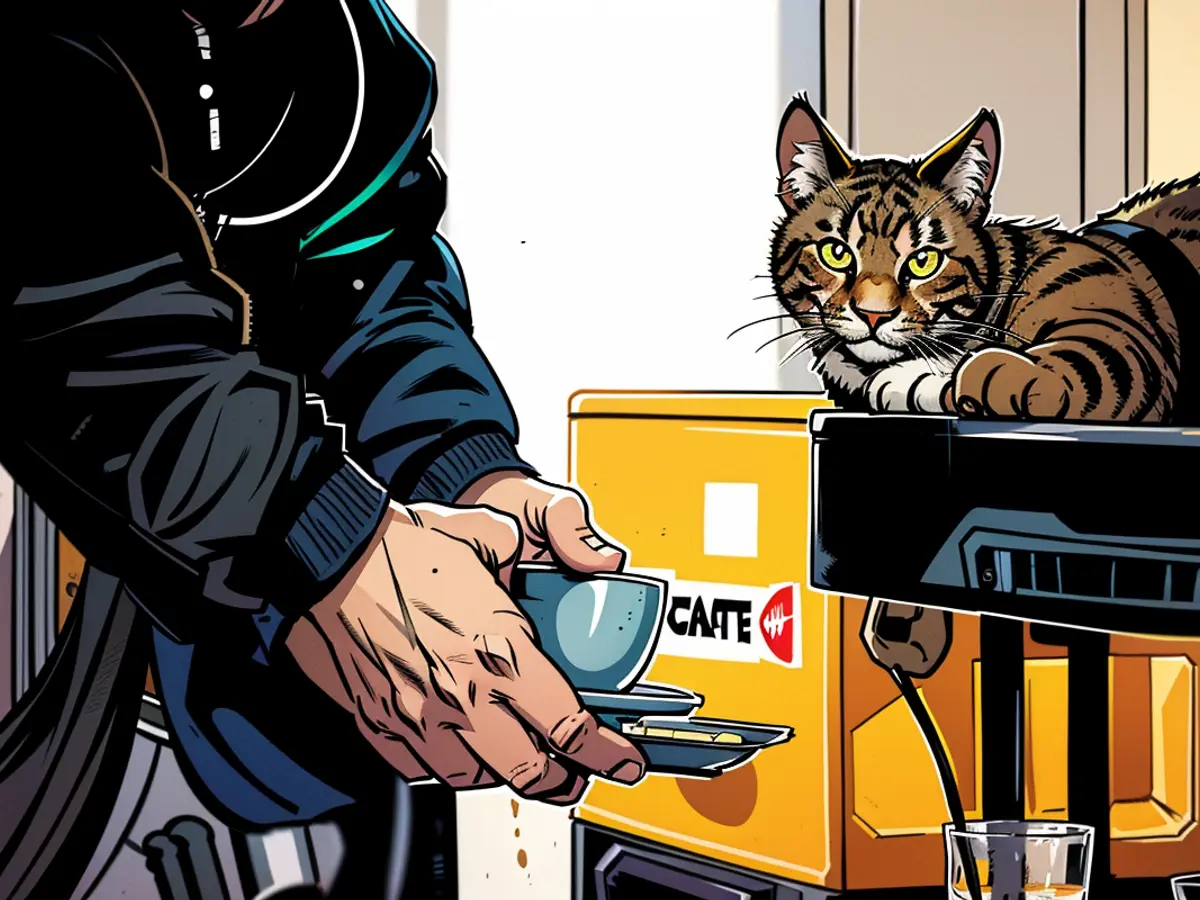Cat cafes may not solely offer pleasure for four-legged individuals' human counterparts.
Relaxing with animals is often a soothing experience for people. Cat cafes, which are already quite popular, are enjoying a significant upsurge. But, what about the animal's wellbeing in this context?
Felix, comfortably lounging on a chair, observes the activities around him. A young lady sits facing the feline companion, clearly joyous to have the tabby cat for her mid-day coffee. Richard Gottlob recounts his initial encounter with Felix, the black-and-white house cat, "Little Felix instantly hopped onto my lap." Gottlob is one of the co-owners of the Berlin cat café, "Catnip Coffee," located in the Berlin district of Friedrichshain-Kreuzberg.
Besides Felix, the café also houses the cats Simba, Furby, and a feline named Princess Junko. Daily, the animals interact with the café visitors. They play, sleep, watch, and petting is never neglected. "We offer visitors a beautiful ambiance and the cats a beneficially designed living space for them," Gottlob explains the concept of the café.
Both cat cafes and experiences like hiking with alpacas or even yoga with puppies delight animal lovers. However, animal welfare often suffers due to these offerings, according to the German Animal Welfare Association and the Veterinary Association for Animal Welfare.
Prioritizing cat welfare?
Gottlob, along with co-owner Patrick Frauenheim, established the cat café about a year ago. They drew inspiration from Hong Kong and Singapore. Although the concept was born in Asia, the trend has recently spread to Germany. However, after observing Singaporean cat cafes, Gottlob expresses shock. Often, the feline companions are kept in confined living conditions. Even fluffy-looking house tigers are typically chosen solely based on their appealing appearance.
At "Catnip Coffee," the wellbeing of the cats is of utmost importance. If the animals find the crowd overwhelming, they can retreat to their designated rooms. The café cats are adopted from the animal shelter. The café owners focused on the cat's personalities. "In some cafes, you have very timid cats that are also afraid and run away. That wouldn't fit here," Gottlob explains.
When visiting the animal shelter, the café owners presented a protection plan to the employees and conducted a handling certifications course. Afterward, the veterinary office also paid a visit to the shelter. Since such a unique café requires approval from the authorities, it was a necessary step.
Upon entering the "Catnip Coffee" for the first time, visitors are informed about the rules, such as not to grab too tightly, pick up, chase, or feed the animals with cake. If rules are violated, the visitors receive warnings, and if the misconduct continues, they are asked to leave.
Criticism from animal welfare organizations
Animal welfare organizations are generally critical of this trend. "From the German Animal Welfare Association's perspective, we would not support the opening of a cat café due to several considerations," says press spokeswoman Nadia Wattad. Cats are sensitive to changes. A café is frequented by many different people, leading to intense scents and loud noises.
Even for veterinarian Sandra Giltner of the Veterinary Association for Animal Welfare, cat cafes should be approached with caution - despite the owner's focus on welfare. "I understand the motivation, and it's indeed noble, but for the animal, it's already a significant burden," explains Giltner. Signs of stress in house cats are often challenging to detect. As a result, a "very, very high level of expertise" is necessary even when selecting the cats.
However, not all cat cafes can be painted with the same brush, says Wattad from the German Animal Welfare Federation. It also depends on the cat's personality. Giltner emphasizes that whether a cat café is sensible or not is often a case-by-case decision. Since some animals may delight in the varied lifestyle, "it always depends on how well the cat cafes are managed."
Puppy yoga, however, is considered much more critically. According to Giltner, it's "an absolute disaster" from an animal welfare perspective. Young dogs are often separated from their mothers and brought into an entirely unfamiliar environment. Initially, they might enjoy the play and petting, "but puppies have a very short energy window before they tire," says Giltner. Moreover, young dogs are often not yet vaccinated and susceptible to diseases.
Videos of puppies playing on social media platforms like Tiktok are frequently misunderstood, says Wattad. If a small dog falls asleep curled up among yoga mats, it's not a sign of relaxation, but rather an indicator of overwhelm.
Hiking with alpacas is viewed more positively. "If the group is calm, and you just do something like a snowy hike, it's not even legally questionable from an animal welfare perspective," says Giltner. As long as it's done in a species-appropriate manner and the cuddly camels are not separated from their herd. However, one should not touch the animals despite their fluffy fur, says Wattad. "They tolerate it, but because they actually don't seek contact with humans, it's stressful for the animals."
Based on Giltner's viewpoint, there are numerous ways to engage with animals, preferably by aiding animals in distress. You could, for instance, lend a hand by taking dogs for walks with animal welfare groups or cuddle cats at animal shelters. However, it's essential to remember, "We hold no entitlement to access an animal at any given hour."
As per Gottlob's perspective, Catnip Coffee in Berlin values animals over humans. He states, "For me, this place serves as the cats' living room, and we're all just guests here." It's not a petting zoo, despite the fact that the four felines enjoy their share of affectionate pats.
The popularity of cat cafes, like "Catnip Coffee," is leading to an increase in such establishments, and Gottlob and Frauenheim ensure the cats' wellbeing is prioritized by adopting them from the animal shelter and focusing on their personalities.
Despite the attention given to animal welfare in certain cat cafes, both Wattad and Giltner express caution, emphasizing the need for a high level of expertise when selecting cats and managing the café environment to minimize stress for the animals.







